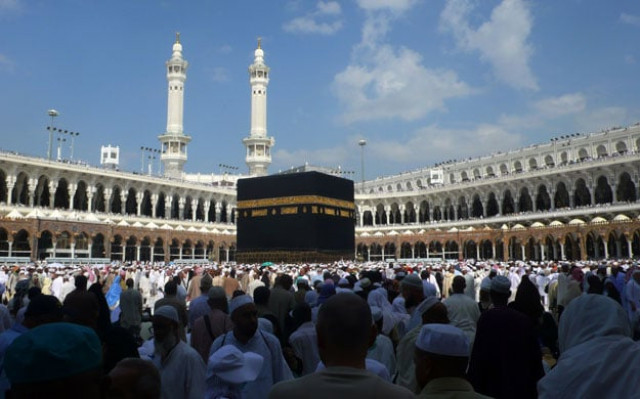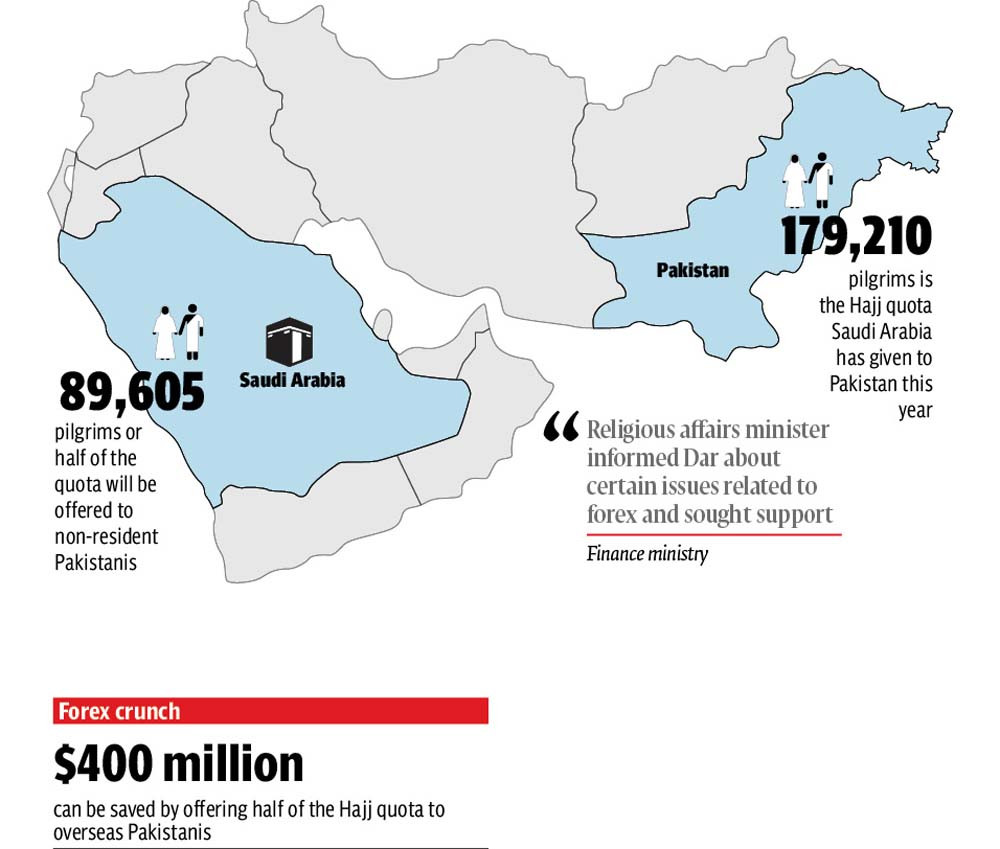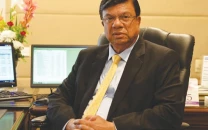Hajj quota cut to save forex
About 90,000 Pakistanis may not perform Hajj due to dollar shortage

The government has decided, in principle, to give half of the Hajj quota of its citizens to Pakistanis living abroad aimed at saving the outflow of around $400 million, a move that underscores the implications of economic crisis for all walks of life.
Overseas Pakistanis can themselves perform Hajj or finance the expenses of someone living in Pakistan by availing of the quota, which the government is going to offer due to foreign currency shortage, according to government sources.
The decision was taken in a meeting between Finance Minister Ishaq Dar and Minister for Religious Affairs Mufti Abdul Shakoor. The matter will now be placed before the federal cabinet for approval, including the cost of Hajj, which may this year range from Rs1.2 million to Rs1.3 million per person, according to officials who attended the meeting.
“Because of foreign exchange-related constraints, it has been proposed that half of Pakistan’s Hajj quota may be allocated to overseas Pakistanis,” said Umar Butt, Assistant Director Media of the Ministry of Religious Affairs, after the meeting.
The meeting was apprised of the Hajj-2023 policy and the expected number of Pakistanis applying to perform Hajj, said the Ministry of Finance.
This year, Saudi Arabia has given a Hajj quota of 179,210 pilgrims to Pakistan but due to severe economic constraints, the government cannot afford to allow a massive capital flight, said a finance ministry official.
Keeping that in mind, it was decided in the meeting that half of the quota, or 89,605, would be offered to non-resident Pakistanis. The non-resident Pakistanis could either avail of the quota themselves or sponsor someone from Pakistan, said the official.
Savings and the cost of Hajj cannot be exactly assessed at this time, as it will depend on the exchange rate that the authorities apply. Religious affairs ministry officials said that the cost may be over Rs1.2 million per person, at least 71%, or Rs500,000, higher than the previous year.
It was estimated that around $400 million could be saved by offering half of the quota to the non-resident Pakistanis, they added.
Still, the government needs money to facilitate pilgrimage for the remaining half. It was discussed in the meeting that at least $284 million was immediately needed for the purpose.
The government has long been denying the severity of the economic crisis but at the same time it is curbing the outflow of dollars like giving up half of the Hajj quota, restricting imports and the outflow of dividends.
This has created a huge backlog that will take months to clear even if inflows of foreign currency begin after the revival of International Monetary Fund (IMF) loan programme.
Pakistan is also exposed to higher inflation owing to the shortage of commodities caused by curbs on the outflow of dollars.
“Mufti Abdul Shakoor, Federal Minister for Religious Affairs, informed the finance minister about certain issues related to foreign exchange and sought his support,” said a statement released by the finance ministry.

design: mohsin alam
Dar stated “Hajj is a sacred religious obligation to be performed by every Muslim and we have to contribute our part for the blessings of Almighty Allah,” it added.
The finance minister committed to extend maximum support and cooperation for facilitating the pilgrims to make the religious event blessed and peaceful, said the ministry.
Pakistan International Airlines (PIA) has announced Hajj fares, fixing those from $870 to $1,220, according to the Express News.
Meanwhile, Turkiye Ambassador Dr Mehmet Pacaci called on Ishaq Dar at the Finance Division on Saturday.
The ambassador requested the minister to facilitate payments to Turkish Airlines, which was also affected by the government’s curbs on the outflow of dollars.
A British airline has already announced the end of its operations to and from Pakistan, one of the reasons was the non-repatriation of earnings from Pakistan.
Some foreign airlines now do not directly sell air tickets to Pakistan due to currency-related problems.
The ambassador also urged the finance minister to release the goods imported by one of its electrical product manufacturers whose operations had been curtailed due to the restrictions on imports.
The IMF has already asked Pakistan to withdraw the guidelines issued to commercial banks for rationing foreign currency, terming these restrictions a violation of the IMF charter.
The global lender sees the current suppressed imports as artificial, which has resulted in keeping the price of rupee still above the market price, if trade is allowed to happen in a normal fashion.
Published in The Express Tribune, March 5th, 2023.
Like Business on Facebook, follow @TribuneBiz on Twitter to stay informed and join in the conversation.


















COMMENTS
Comments are moderated and generally will be posted if they are on-topic and not abusive.
For more information, please see our Comments FAQ